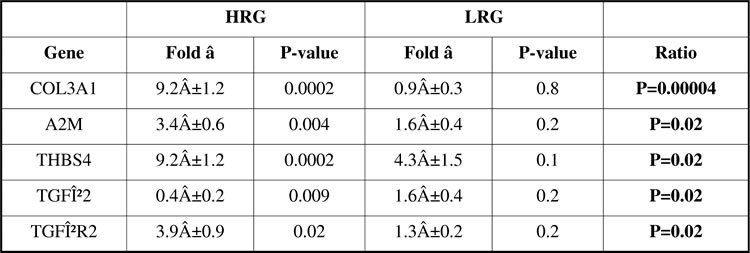Adaptation to aerobic training is highly variable. We determined whether there was a molecular basis for training responsiveness. 24 male subjects undertook supervised aerobic training; cycling at 75% of peak VO2 (4 times per week, 6 weeks). The study was approved by the Institute ethics committee. Peak aerobic capacity, submaximal heart rate response (@75% of peak VO2) and 15min exercise performance (KJ) were quantified. Subjects were ranked on the basis of the sum of their % improvements across these 3 variables. Muscle gene expression was studied in the top 8 (HRG, 24±1yr, 183±3cm, 77±6kg, Baseline VO2peak =3.5±0.3 l/min) and compared with the 8 lowest ranked subjects (LRG, 23±1yr, 180±3cm, 77±3kg, Baseline VO2peak =3.7±0.1 l/min). Cumulative increase in aerobic fitness index was 10±2% in the LRG and 55±4% in the HRG (P<0.0001). There was no relationship between baseline physiological variables and the magnitude of improvement observed (n=24).Genes associated with extracellular matrix remodelling were influenced by training. Transforming growth factor β (TGFβ) signalling influences a variety of extracellular processes by precipitating the association of receptor kinases on the cell surface. Typically associated with muscle growth inhibition, TGFβ-2 is over-expressed in damaged skeletal muscle (Murakami et al 1999). Higher A2M (a negative regulator of TGF-β2) combined with reduced TGFβ2 expression and a typical (for this family) compensatory increase in receptor expression (TGFβR2) suggests that withdrawal of TGF-β2 signalling is important for muscle adaptation to exercise. In addition, THBS4, a member of a gene family that regulate TGF-β signalling appears related to increased aerobic fitness. A loss of function polymorphism in THBS4 is associated with coronary events in humans (Stenina et al 2004) and our data indicates that aerobic fitness may be a potential explanatory link. In the present study, suppression of the TGFβ2 system appeared essential for gains in aerobic fitness.
University of Nottingham (2004) J Physiol 558P, C6
Communications: Transcript profiling identifies genes that define lack of responsiveness to endurance training in humans
Timmons,James A; Fischer,Helene ; Gustafsson,Thomas ; Jansson,Eva ; Greenhaff,Paul ;
1. Department of Physiology and Pharmacology, Karolinska Institutet, Stockholm, Sweden.
View other abstracts by:
Where applicable, experiments conform with Society ethical requirements.

